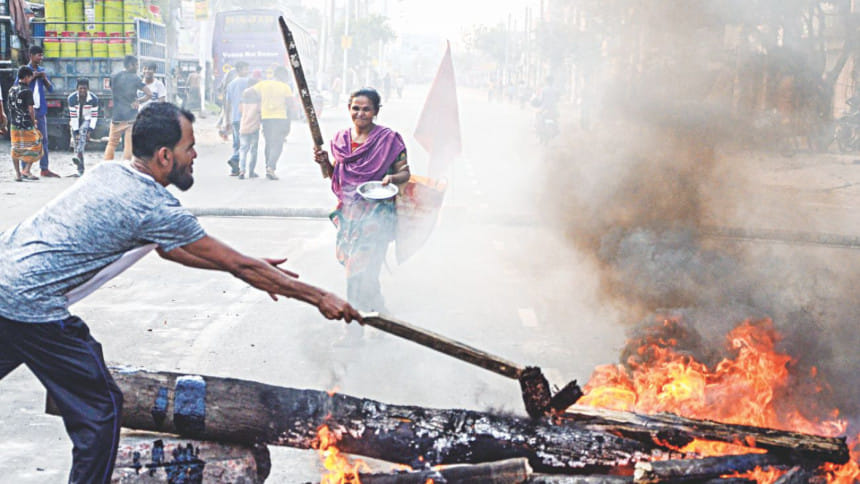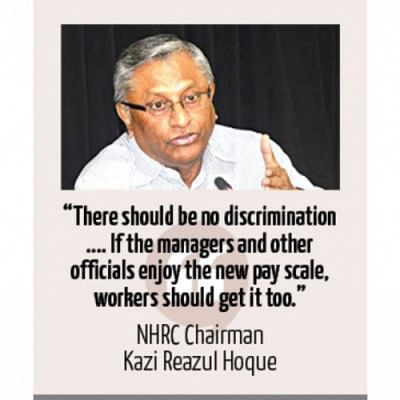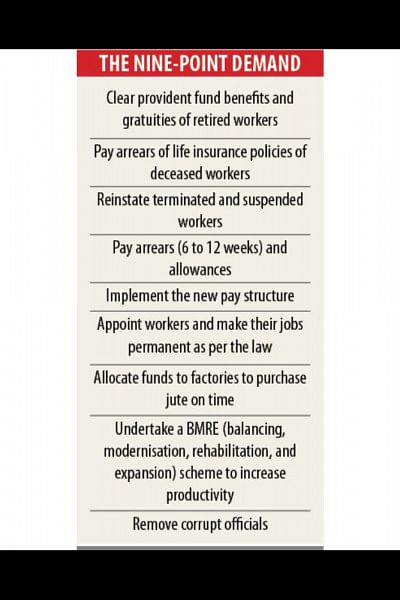Jute Workers: No pay scale in 9 years, no pay for months

On September 7, 2015, the cabinet approved the eighth national pay scale effective from July that year, and it has been implemented in al-most all government offices and corporations.
But four years on, some 60,000 workers of the 22 state-run jute mills are still waiting, although all officials and employees under the jute ministry, including the Bangladesh Jute Mills Corporation, are drawing their salaries under the new scale.
On top of this, the workers have not been paid for six to 12 weeks, with many literally starving as The Daily Star has seen during visits to Khulna and Demra in the capital. Officials and employees of the mills have also not been getting their salaries for two to four months.
Against this backdrop, workers have called an indefinite general strike at all state-run jute mills from today to realise their nine-point demand, including implementation of the new pay scale and clearing of all arrears. This will mean a production loss of about Tk 8 crore a day.

Workers will also block roads and railways across the country, also for an indefinite period, from 4:00pm to 7:00pm every day beginning today.
“We are not getting our wages. We are not getting the new pay scale. Isn’t it a human rights and justice issue? We urge the National Human Rights Commission and the High Court to tell the government to clear our dues,” said a worker of Latif Bawany Jute Mills in Demra.
Mizanur Rahman, the jute secretary, said, “We could not implement the new wage scale, because we couldn’t manage the fund. However, we have started fixation. But it would be tough to implement the new scale if we don’t get money from the government. It will be in document, but Allah knows when it could be paid.”
Meanwhile, workers said that they had to return to the streets as their arrears were not paid even two weeks after the deadline set by the labour department.
On April 15, labour leaders held a meeting with the BJMC chairman and jute ministry officials at the BJMC office to discuss their demands, including the arrears and new pay scale.
After the meeting, the labour department issued a circular saying all dues would be cleared by April 25. But the mill authorities are yet to pay them.
“Enough with the promises. We are not leaving the streets until our dues are cleared,” said Sardar Mozahar Uddin, president of Bangladesh Jute Mills Workers League, which represents all state-run jute mills workers.

THE DISCRIMINATION
The eighth national pay scale was announced in July 2015, five years after the previous one, as is the rule.
Within months, the new scale took effect for almost all of some 23 lakh government officials and employees, including the civil servants.
But for jute workers, nothing comes easy.
After a series of street protests, the labour and employment ministry finally issued an order to implement the new pay scale in October last year.
It also directed the jute ministry to issue a circular in this regard, but the jute ministry has not done so yet, BJMC sources said.
Then last month, the BJMC directed all the state-owned jute mills to fix the pay in line with the new pay scale.
A top BJMC official yesterday said the process was likely to be completed by this month and the new pay scale for the workers might take effect from next month.
Under the new scale, workers’ minimum pay will double from Tk 4,150 to Tk 8,300, effective from July 1, 2015.
The total arrears till June this year, about Tk 1,600 crore, will be paid in two installments -- one in this fiscal year and another in the next, according to the labour ministry’s circular.
But Rita Rani, 40, is skeptical. She has been a casual worker at Latif Bawany Jute Mills for 14 years and heard many such “empty promises”.
“The pay of the managers and officers has been hiked. But they did not do anything for us. They do not pay our wages even. How will we eat?” said Rita, who has not been paid for eight weeks like all of her colleagues at the mills in Dhaka’s Demra.
Contacted, National Human Rights Commission Chairman Kazi Reazul Hoque said, “There should be no discrimination …. If the managers and other officials enjoy the new pay scale, workers should get it too.”
NO PAY, NO FOOD
Anwara Begum, 45, has never taken to the streets over wages before. But she has no other choice this time -- she has not been paid for eight weeks and does not know how to feed her five-member family.
“For Sehri, I took some Panta Bhaat with smashed potato. I had my Iftar with rice and Kolmi Shak, which I collected from a ditch,” Anwara, who joined Latif Bawany in 1993, said on Saturday.
Dozens of workers from across the country shared similar experiences.
Some said they were not fasting because they could not afford any food for Sehri. Others go to nearby mosques for Sehri and Iftar. One worker said his son needed an emergency surgery but there was no money to to pay for it.
Officials and employees of the state-run jute mills are in a similar situa-tion. Their salaries are due for two to four months.
“I’m a teacher. I cannot even go to people to seek help, you know. My wife asks me why I do a job that cannot feed the family,” said a teacher of Latif Bawany school.
He has not been paid for three months.
Salary payments at the BJMC head office in the capital’s Motijheel are up-to-date.
Meanwhile on May 6, the jute ministry wrote to the finance ministry asking for Tk 337.87 crore -- TK 325 crore for unpaid wages and Tk 85 crore for salaries.
“We will be able to clear the dues if we get the money from the minis-try. It’s under the consideration of the ministry, and we are waiting,” BJMC Chairman Shah Mohammad Nasim said yesterday.
Jute mills authorities say they often fail to pay the workers and employees as they cannot make profit because of high production cost.
Last year, the sector incurred a loss of Tk 466 crore.
But why must the workers and employees suffer for the failure of the management to make profit?
The NHRC chairman said they should not.
“Although the jute sector is in bad shape, it is the only income source for the workers. If they don’t get money, how would they survive?... The government should pay their wages and ensure that the workers get back to work,” he said.

 For all latest news, follow The Daily Star's Google News channel.
For all latest news, follow The Daily Star's Google News channel. 



Comments